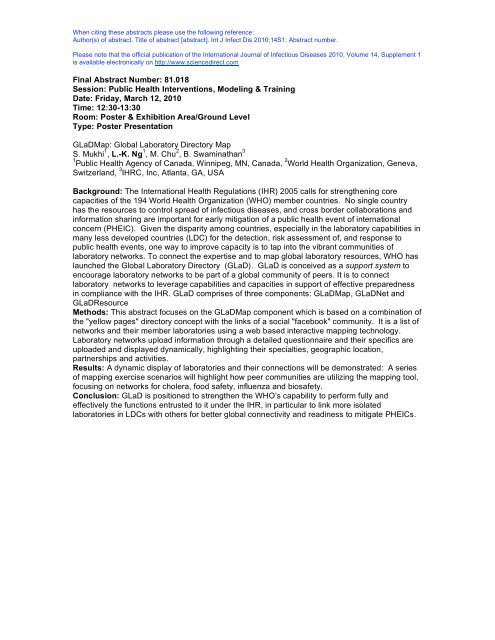14th ICID - Poster Abstracts - International Society for Infectious ...
14th ICID - Poster Abstracts - International Society for Infectious ...
14th ICID - Poster Abstracts - International Society for Infectious ...
Create successful ePaper yourself
Turn your PDF publications into a flip-book with our unique Google optimized e-Paper software.
When citing these abstracts please use the following reference:<br />
Author(s) of abstract. Title of abstract [abstract]. Int J Infect Dis 2010;14S1: Abstract number.<br />
Please note that the official publication of the <strong>International</strong> Journal of <strong>Infectious</strong> Diseases 2010, Volume 14, Supplement 1<br />
is available electronically on http://www.sciencedirect.com<br />
Final Abstract Number: 81.018<br />
Session: Public Health Interventions, Modeling & Training<br />
Date: Friday, March 12, 2010<br />
Time: 12:30-13:30<br />
Room: <strong>Poster</strong> & Exhibition Area/Ground Level<br />
Type: <strong>Poster</strong> Presentation<br />
GLaDMap: Global Laboratory Directory Map<br />
S. Mukhi 1 , L.-K. Ng 1 , M. Chu 2 , B. Swaminathan 3<br />
1 Public Health Agency of Canada, Winnipeg, MN, Canada, 2 World Health Organization, Geneva,<br />
Switzerland, 3 IHRC, Inc, Atlanta, GA, USA<br />
Background: The <strong>International</strong> Health Regulations (IHR) 2005 calls <strong>for</strong> strengthening core<br />
capacities of the 194 World Health Organization (WHO) member countries. No single country<br />
has the resources to control spread of infectious diseases, and cross border collaborations and<br />
in<strong>for</strong>mation sharing are important <strong>for</strong> early mitigation of a public health event of international<br />
concern (PHEIC). Given the disparity among countries, especially in the laboratory capabilities in<br />
many less developed countries (LDC) <strong>for</strong> the detection, risk assessment of, and response to<br />
public health events, one way to improve capacity is to tap into the vibrant communities of<br />
laboratory networks. To connect the expertise and to map global laboratory resources, WHO has<br />
launched the Global Laboratory Directory (GLaD). GLaD is conceived as a support system to<br />
encourage laboratory networks to be part of a global community of peers. It is to connect<br />
laboratory networks to leverage capabilities and capacities in support of effective preparedness<br />
in compliance with the IHR. GLaD comprises of three components: GLaDMap, GLaDNet and<br />
GLaDResource<br />
Methods: This abstract focuses on the GLaDMap component which is based on a combination of<br />
the "yellow pages" directory concept with the links of a social "facebook" community. It is a list of<br />
networks and their member laboratories using a web based interactive mapping technology.<br />
Laboratory networks upload in<strong>for</strong>mation through a detailed questionnaire and their specifics are<br />
uploaded and displayed dynamically, highlighting their specialties, geographic location,<br />
partnerships and activities.<br />
Results: A dynamic display of laboratories and their connections will be demonstrated: A series<br />
of mapping exercise scenarios will highlight how peer communities are utilizing the mapping tool,<br />
focusing on networks <strong>for</strong> cholera, food safety, influenza and biosafety.<br />
Conclusion: GLaD is positioned to strengthen the WHO’s capability to per<strong>for</strong>m fully and<br />
effectively the functions entrusted to it under the IHR, in particular to link more isolated<br />
laboratories in LDCs with others <strong>for</strong> better global connectivity and readiness to mitigate PHEICs.
















